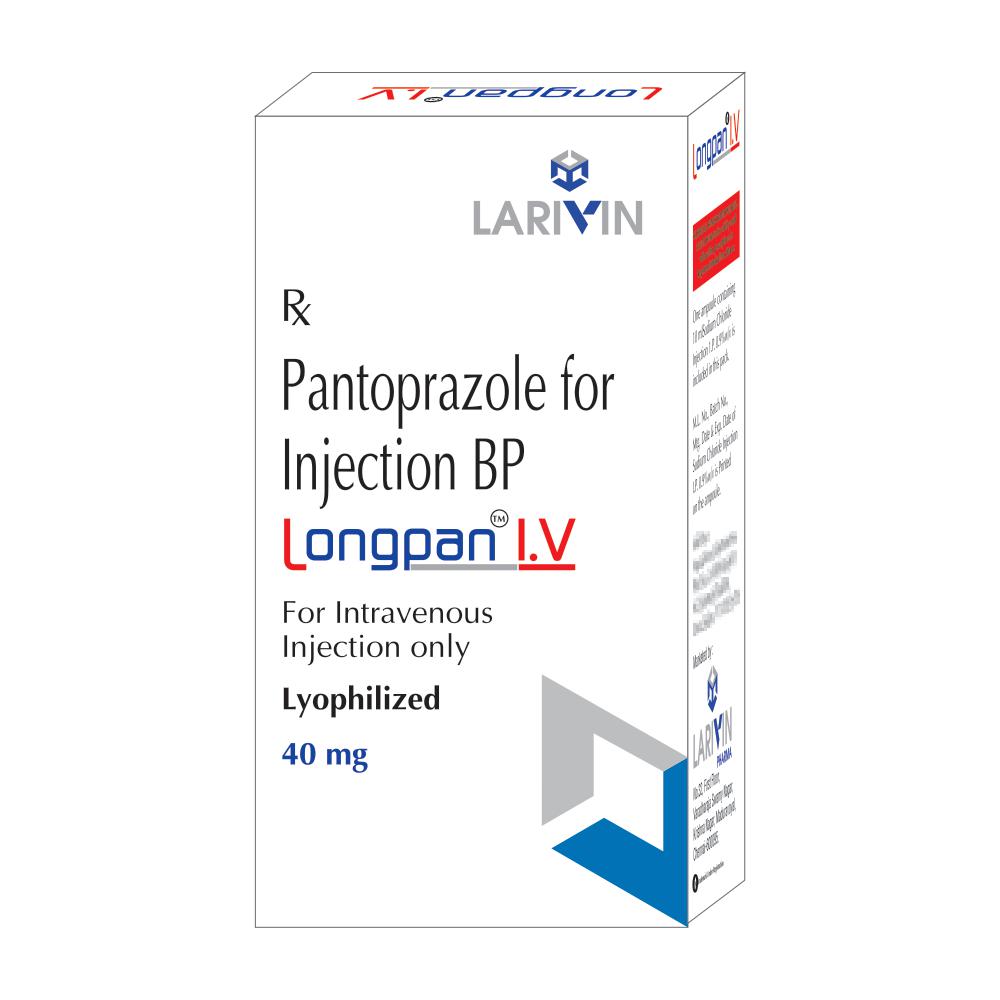- 044-24812581
- Plot No 15, 27th Street, Natesan Nagar, Maduravoyal, Chennai 600095
- +91 7845883586
- info@larivinpharma.com
LONGPAN I.V

Prefer the LONG ACTING PPI…
LONGPAN IV
Pantoprazole 40 mg Injection
Tagline:
Prolonged Relief from Acid-Related Disorders
Indication:
Longpan IV is indicated for the treatment of various acid-related gastrointestinal conditions, particularly in situations requiring intravenous administration, such as:
- Erosive Esophagitis: Treatment of erosions in the esophagus caused by stomach acid.
- Active Duodenal Ulcer with Bleeding: Management of bleeding ulcers in the duodenum, reducing the risk of rebleeding.
- Active Gastric Ulcer with Bleeding: Effective in controlling bleeding gastric ulcers and promoting healing.
- Stress Ulcer Prophylaxis: Prevention of stress-induced ulcers, particularly in critically ill patients.
- Gastroesophageal Reflux Disease (GERD): Management of GERD symptoms and esophageal erosions.
- Zollinger-Ellison Syndrome: Treatment of pathological hypersecretory conditions, including Zollinger-Ellison syndrome.
Mode of Action:
Pantoprazole, the active ingredient in Longpan IV, is a proton pump inhibitor (PPI) that works by inhibiting the hydrogen-potassium ATPase enzyme system (the proton pump) in the parietal cells of the stomach lining. This action blocks the final step of acid production, leading to a significant and sustained reduction in gastric acid secretion. By lowering stomach acid levels, Pantoprazole helps prevent and treat acid-related conditions, such as peptic ulcers, GERD, and Zollinger-Ellison syndrome.
Intravenous administration of Pantoprazole after endoscopic therapy for peptic ulcer bleeding has been shown to reduce rates of ulcer rebleeding, the need for surgical intervention, and the overall duration of hospital stay.
How to Take Longpan IV:
- Administration: Longpan IV is administered as an intravenous (IV) injection or infusion. The preparation and administration should be carried out by a healthcare professional in a clinical setting.
- Dosage Frequency: The standard dosage is 40 mg once daily. The exact duration and frequency of treatment depend on the specific condition being treated and the patient’s response.
- Reconstitution: The injection should be reconstituted with the appropriate diluent before administration, following the manufacturer’s instructions or healthcare provider’s guidance.
Dosage:
- Standard Dosage: 40 mg of Pantoprazole administered once daily via intravenous injection or infusion.
Possible Side Effects:
While Longpan IV is generally well-tolerated, some patients may experience side effects. Common side effects include:
- Injection Site Reactions: Pain, swelling, or redness at the injection site.
- Gastrointestinal Issues: Diarrhea, nausea, vomiting, or abdominal pain.
- Headache: Some patients may experience mild to moderate headaches.
- Dizziness: A sensation of lightheadedness may occur, particularly in sensitive individuals.
- Allergic Reactions: Rash, itching, or hives. Severe allergic reactions (anaphylaxis) are rare but require immediate medical attention.
- Hypomagnesemia: Long-term use of PPIs, including Pantoprazole, may lead to low magnesium levels in the blood, potentially causing symptoms such as muscle cramps, irregular heartbeat, or seizures.
Precautions:
- Liver Function: Use with caution in patients with liver impairment. Monitoring of liver function may be necessary.
- Bone Fractures: Long-term use of PPIs has been associated with an increased risk of bone fractures, particularly in the hip, wrist, and spine. This risk is higher in patients on high-dose or long-term therapy.
- Clostridium difficile Infection: PPIs like Pantoprazole may increase the risk of Clostridium difficile-associated diarrhea, especially in hospitalized patients.
- Vitamin B12 Deficiency: Long-term use of Pantoprazole may reduce the absorption of vitamin B12, potentially leading to deficiency over time.
- Drug Interactions: Inform your healthcare provider of all medications you are taking, as Pantoprazole can interact with certain drugs, potentially affecting their efficacy.
Consult Your Doctor:
- Before starting Longpan IV if you have any known allergies, particularly to PPIs, or if you have liver disease or other significant health conditions.
- If you experience any severe or unusual symptoms, particularly signs of hypomagnesemia, allergic reactions, or gastrointestinal distress.
- For guidance on managing your condition and to discuss any concerns regarding your treatment plan.
Disclaimer: This information is for general knowledge only and should not be considered medical advice. Always consult with a healthcare professional for personalized guidance.
